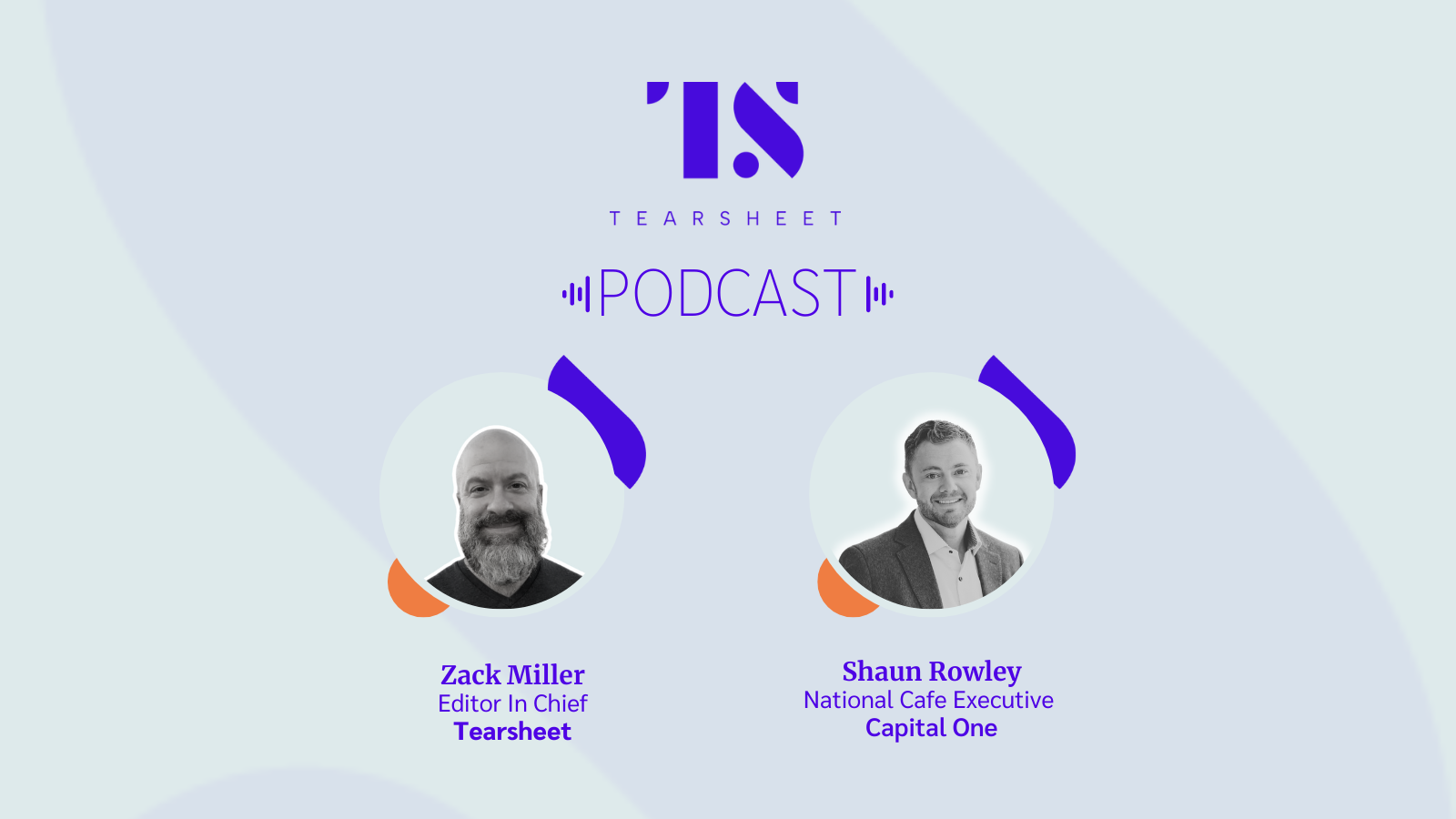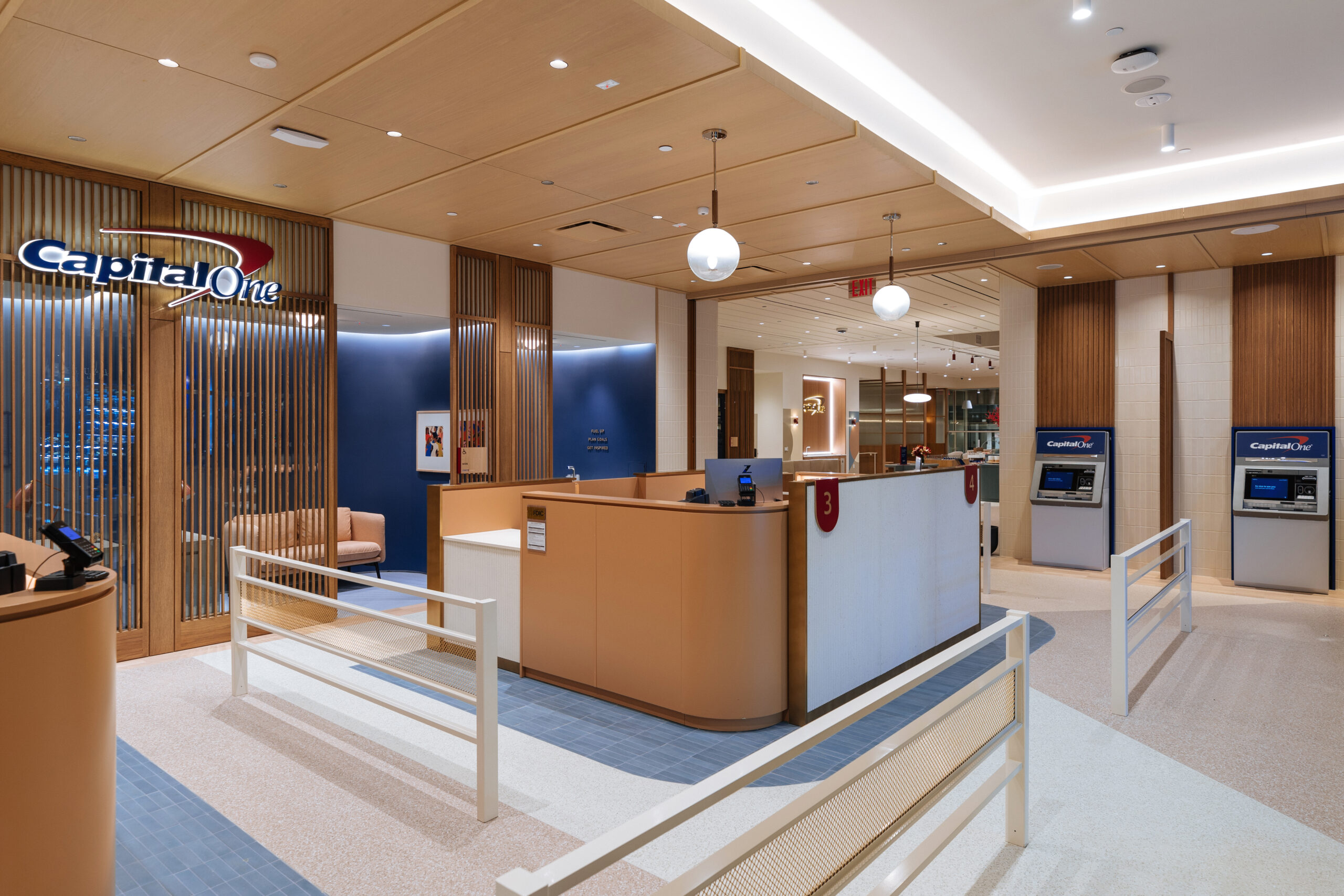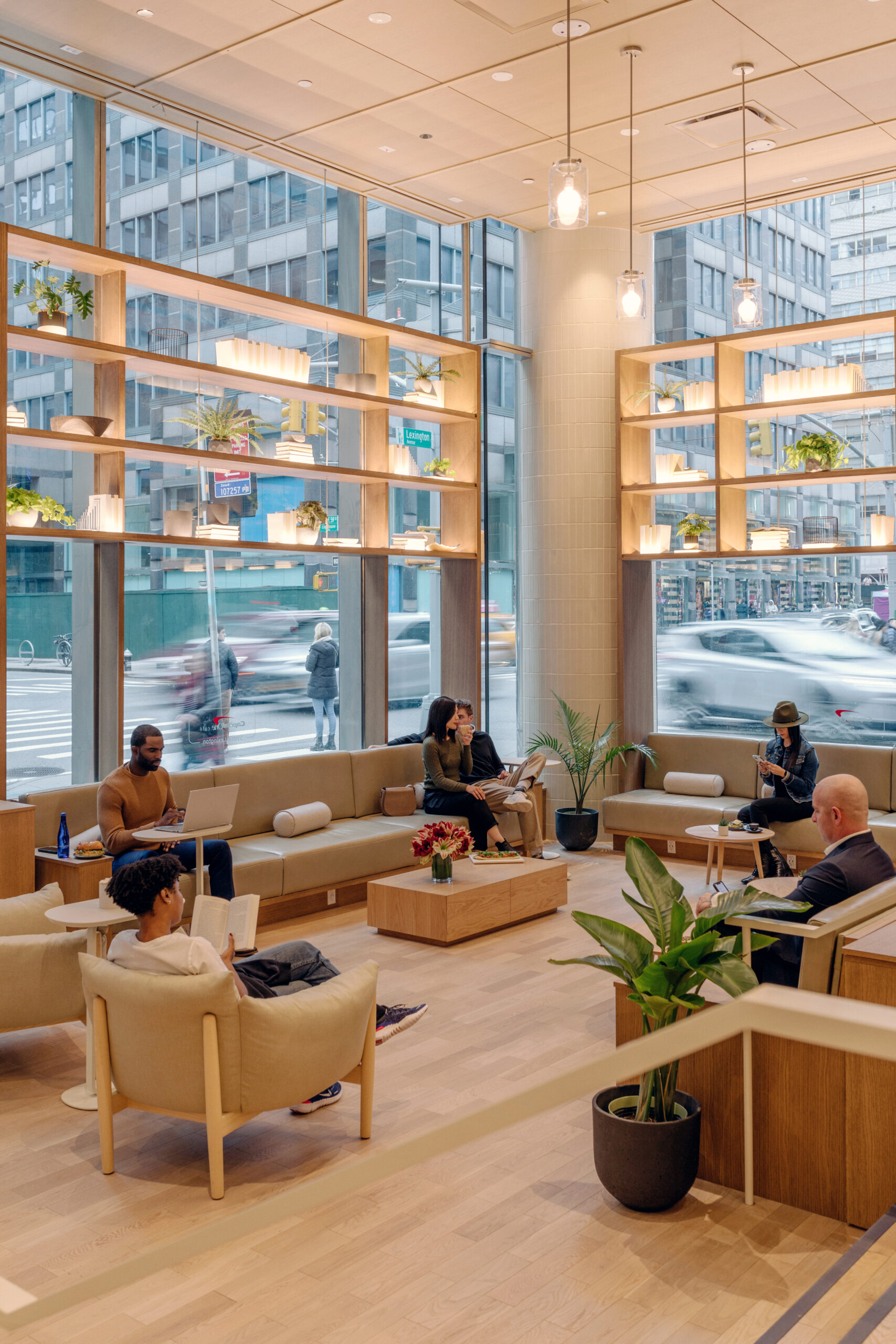How Capital One Cafes help Gen Z start money conversations, connecting into local communities
- Capital One Cafes are part of the bank's community strategy, more conversation-opener than product pusher.
- We speak with Shaun Rowley, head of Cafes at the bank, about the impact the banks have on communities and particularly, on younger customers, in a new series about Gen Z.

We’re kicking off a special podcast series where we explore this fascinating Gen Z deeper: their relationship with money, how they like to save, spend, and borrow money, their fears and aspirations, and their connections to social issues.
Tearsheet thanks our sponsor Publicis Sapient for their support. Read more about Gen Z and financial services at Steez.
Our first podcast in the series is with Capital One’s Shaun Rowley. Shaun is the National Capital One Café Executive, supporting all of the bank’s Cafés throughout the country but calls St. Cloud, Minnesota home. He celebrated 20 years with Capital One this year. Since starting as a part time contact center associate, he has held multiple positions in front line teams, product, marketing, strategy, and analysis.
Capital One’s participation in this series doesn’t imply any type of endorsement of Tearsheet or its sponsors.
Subscribe: Apple Podcasts I SoundCloud I Spotify I Google Podcasts
The following excerpts were edited for clarity.
The Cafe strategy

Capital One uses its over 50 Cafes around the US to bring banking to life within local communities. It started a couple of decades ago — the concept came from a conversation in a strategy session.
“This general idea of why can’t banking be as simple as a cup of coffee — it should be when you want it, and it should just work. But behind the scenes, there should be a lot of craft, love ,and care that goes into making that work each and every time,” Rowley said.
“Why not reimagine banking and make it a place where people can come in and relax and recharge, and whether or not you’re a Capital One customer or not, really find value in that experience?”
The Cafes are open to all — you don’t have to be a Capital One customer to grab a snack or a coffee or tea, enjoy a cozy space to co work, write, or connect with others. Rowley says the majority of people who come into the Cafes aren’t banking customers.
“If you’re comfortable enough with your brand and your products and your experience to invite anyone in for any reason, that really says something,” he said.
But while Cafes hearken back to an old-school concept of community banking, when the bank opened them, it wasn’t clear that the communities they launched them in would accept them.
“What I don’t think we ever expected is that the communities themselves really embrace them and bring them to life. And that really is the magic of our cafes: they become these hubs for local communities to connect with us and each other around something bigger, something about how to start to think about. how to reimagine banking, and furthering their financial journey overall,” Rowley said.
The Cafe experience
The first priority for Cafes when someone walks in through the doors is to connect with that person where they’re at. That sets the tone for a colorful experience that’s going to be different depending on which of the firm’s over Cafes across the country a person enters.

“The consistent thread that you’re going to get is to come in and see a warm, welcoming space, full of ambassadors, who are our team members that are there to help you and not sell you, to greet you and guide you around the space itself,” he said.
The message around saving money starts early for Capital One clients — customers are able to purchase the Cafe’s handcrafted Verve coffee, a popular third wave roaster, for 50% off.
There are also meeting rooms for nonprofits to use for free. There are private rooms — what Capital One calls Nooks — to do some heads down work or connect with another person.
It’s not just coffee and co-working — people can avail themselves of financial information via Money & Life mentoring, which is where Capital One ambassadors offer a free, personal conversation about a person’s relationship with money, with the hope that she can continue on in that journey.
Ambassador: A new role in banking
Staffing the Cafe are Capital One’s Ambassadors who act as a kind of guide for today’s customers, helping them help themselves to get comfortable around setting and reaching financial goals. That’s not easy to do in a culture that still views conversations around money as taboo.
“Finances can be complex and that can be daunting. Having someone there to help you and not sell you is definitely our goal overall. Our ambassadors are designed to really meet you where you are, and whether you’re saving up for your first $1,000 savings goal or whether you’ve made your second $100,000 that you’re looking to optimize, they can really help you discover where you’re at right now and what tools and resources might add the most value for you and help you on your journey,” Rowley said.
Rowley said the ambassador’s role isn’t to create reliance or hierarchical advice giving — it’s all part of Capital One’s self service model to give customers control, autonomy, and confidence to bank on their own.
“We want to make it so that everything that you do when it comes to banking, you can do on your own terms. For most customers and most transactions, that’s as simple as grabbing your phone and having the bank in your pocket. But we know that sometimes, there’s some complexity with that, where you need some somebody to help teach you how to do that for the first time, or give you that confidence or that step up to move in that direction. And that’s where our ambassadors are there,” he said.
How Gen Z connects with Cafes
When Rowley talks about meeting customers where they are, he means not just connecting with them in a physical space like a Cafe but showing up in their ecosystem. That takes form in the bank’s early wage access product or having a no-fee ATM nearby in stores like CVS, Walgreens, Costco, and Target.
“We’re a kind of community banking, but adapted to the modern world. So it is a unique experience. And I think, for Gen Z, that resonates maybe a little bit more, a little bit faster — that feels a little more comfortable, because it emulates a lot of the other experiences that we’ve already adapted to when it comes to retail, or other convenience-based parts of your life. Banking might have been one of the last things to switch over to that,” he said.
Rowley recounts the validation of face to face conversations on a recent trip he took to Richmond, Virginia. There was a group of college students in the Cafe having a study group. Afterwards, he asked them what they were working on, and inspired by the idea that Cafe enables a different type of banking, they were collaborating on a Capital One market research project for school.
Making it easier to talk about money
Chances are that a Gen Z prospect that walks through the Cafe’s doors might not have received good financial education. Talking about money is still tough in America. Capital One’s Cafes are trying to do it differently.
“It gets uncomfortable. My dad was a police officer, my mom was a teacher, and we had conversations about everything. But, money felt a little heavier. I think breaking that down and thinking about that differently is a huge mission of ours in the Cafes, and really has set a different tone and environment for how to have that conversation,” Rowley said.
Judging success of the Cafes
Not all financial institutions could pull off this Cafe concept. If the Cafes were all about generating immediate throughput and sales, they probably wouldn’t work. Capital One’s Rowley says they are about building long term community, adding value to each customer. To do that, it must take a longer term approach and build authenticity in to its touch points with customers.
“You really start to think about success as as an experience model. What did these people know about Capital One? And how might Cafes be able to add value to them? And how did they think about and trust our brand overall? Although that might feel like a longer term journey in terms of success, I think that’s the worthwhile one when it comes to creating a trusted relationship with a brand that you care about. I think we’re willing to take that longer term approach with customers to make sure that we’re building that the right way in an authentic environment,” he said.
Listening to Gen Z
Rowley talks a lot about relationship building. Relationships are two-way conversations made up of talking and listening. Gen Z customers tend to want to be heard, to give feedback and tell their service providers what they need. Cafes provide an important environment to enable that type of interaction.
“The best part of my job is being able to spend time out in the field, talking to customers, talking to our ambassadors, and hearing about their ideas and inspirations are for what banking can be in the future. A fair expectation of most of our Gen Z customers is to be able to interact and have a two way relationship. They want to be able to give feedback and tell you what they want and need. And to know that you’re listening — that’s a huge part of our model. If you’re going to serve the communities out there with something like a cafe, conversation comes along with it,” he said.
The future for Cafes
Capital One has just opened Cafes in a couple of new markets, including one at 59th and Lexington in New York City and another in Stonebriar, Texas, near Dallas.
As the bank manages its existing Cafe footprint and opens the doors to new ones, Rowley is focused on creating something adaptable that grows with its customers, and listens intently to Gen Z’s needs and wants. He remembers a conversation he had with a mother and daughter in a San Francisco Cafe. The daughter was headed to college across the country and the mother wanted to know how convenient getting a cashier’s check would be for her. For the mother, though, getting a cashier’s check means taking time off of work, driving to a branch, parking, and waiting in line. During their conversation, the daughter had quietly checked on her phone that Capital One offers online cashier’s checks and automatically sends the check to the beneficiary.
Getting to know how young people operate and how they define convenience differently is really part of the Cafe’s purpose.
“The cafes have really been our secret to doing that. It really reframed the definition of success and what banking could be in the future. But that really takes you to reimagine your relationship with banking overall, and not just a physical bank or product, but that entire ecosystem,” he said.


